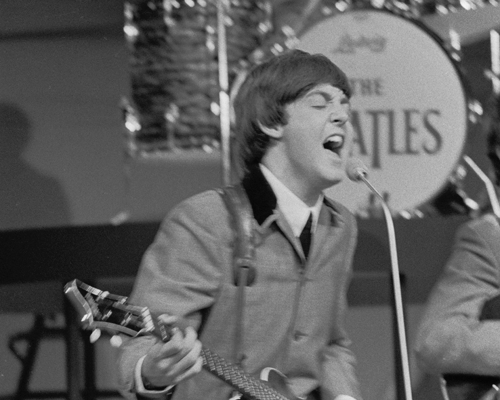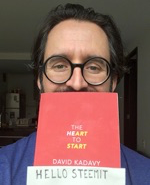“Yesterday” came to Paul McCartney in a dream. Was it a creative miracle?

“Yesterday” has been called the greatest song of the 20th century—some have even called it the greatest song of all time. It is one of the most-covered songs, and one of the highest-earning songs ever.
The melody to “Yesterday” came to Paul McCartney in a dream. He woke up and stumbled to the piano by his bedside to work out the chords. “I just fell out of bed, found out what key I had dreamed it in…and I played it.”
And so one of the greatest songs ever simply came to its composer in a dream.
It’s a nice story, isn’t it? If a creative miracle could happen to Paul McCartney, it could happen to any of us, right? We merely need to wait for inspiration to strike.
I don’t think “Yesterday” was a miracle. It couldn’t happen to any one of us. It could only have happened to McCartney at the place and time it did.
Here’s why:
- Paul McCartney was equipped with the knowledge to turn his dream into a recorded song.
- “Yesterday” wasn’t completed when it came to McCartney. It took another year and a half for it to reach its completed form.
- “Yesterday” was an expression of what was going on in McCartney’s life, and elements from his past. Great art should be this way.
- McCartney was a prolific songwriter. He had many “rolls of the dice” toward creating a song that would last.
The first reason doesn’t need much explanation. Paul McCartney was a musician. He had been playing music all of his life. He was in the most popular band in the world when the melody of “Yesterday” came to him in November of 1963.
McCartney was equipped to turn his musical vision into a reality. Not all of us can do that. I personally have woken up many times with beautiful songs playing in my head, but even after nineteen years of sporadic guitar-playing, I’m still not equipped to make those songs real. That takes practice and dedication.
“Yesterday” didn’t come to McCartney completed. It took eighteen months before it was ready to be recorded.
He had to verify that it was in fact an original song. He said, “I didn’t believe I’d written it. I thought maybe I’d heard it before, it was some other tune, and I went around for weeks playing the chords of the song for people.”
McCartney had the creative flexibility to accept imperfection in the song for a very long time. Placeholders are valuable for busting through creative blocks, and McCartney used placeholders to keep working on “Yesterday.”
For more than a year, the song was called “scrambled eggs.” The placeholder lyrics were absurd: “Scrambled eggs. Oh my baby how I love your legs.”
In the Getting Art Done framework, you’d say that McCartney was keeping himself in the “Generation” mental state, delaying the details so he could work on more pressing issues with the song, such as the “Research” state of verifying that it was even an original song.
Creativity is enhanced by relaxation. McCartney’s story of dreaming the melody of “Yesterday” obviously fits this narrative, but the story of how he came up with the lyrics is just as fitting.
Nearly a year and a half after first coming up with the melody, McCartney was taking a break from a grueling tour schedule to visit the Portuguese coast with his girlfriend, Jane Asher.
When they arrived at the beach house of Bruce Welch, of The Shadows, McCartney asked for a guitar. Since McCartney was left-handed, he had to flip the guitar over to play it. “I think I was the first person to hear the song with the lyrics,” Welch later said, “I realized it was magic, with those chord progressions.”
McCartney had composed the lyrics on the five-hour car ride from the Lisbon airport. He scribbled on a brown-paper envelope while bouncing over dusty roads in the backseat of a chauffeured Opel Kapitan.
Both the melody and the lyrics of “Yesterday” came to McCartney during times of rest—or the “Recharge” mental state in the Getting Art Done framework. The melody came to him while sleeping, and the lyrics came to him while on vacation.
Again, the temptation is to think that “Yesterday” was a miracle.
Even McCartney tends to act in interviews as if “Yesterday” was some kind of miracle. “It was fairly mystical when I think about it,” he said. “It was the only song I ever dreamed.”
There’s no way to know exactly where “Yesterday” came from, but I have my theories. I tend to believe that McCartney just doesn’t have much insight into how his creative work happens.
Consider McCartney’s story about the very first song he wrote, which was called “I Lost My Little Girl.” McCartney wrote “I Lost My Little Girl” shortly after his mother’s death, when he was 14 years old. Was this song about his mother? McCartney is vague about this connection.
Consider that “Yesterday” is yet another romantic song possibly disguised as a song mourning the death of his mother.
When the melody of “Yesterday” came to him, the conditions were perfect for such a song to be jostled from McCartney’s psyche.
Paul had just moved into the house of his girlfriend’s family, on Wimpole Street in London. It was a nice change from living with his bandmates. “It was a nice household instead of a cold flat in Mayfair,” he said. “I hadn’t been happy with Green Street because I was used to a family situation.”
So McCartney had just moved to feel more of a “family situation,” his life was being upturned by success, fame, and a nearly daily touring schedule, and Christmas was just around the corner. Does that seem like a time in which McCartney might miss his mother? Does that seem like a time when he might “long for Yesterday?”
It doesn’t matter that the lyrics hadn’t come to him yet. They were in there somewhere in the feelings that were being expressed by the melody. Again, there’s no way to know for sure, but “Yesterday” isn’t without plausible explanation.
Consider also that there was plenty of “source material” in McCartney’s brain for writing “Yesterday.”
When McCartney first dreamed up the melody, he thought it was an old jazz standard that his father had played. It did turn out to be an original melody, but there are some clear potential sources of influence.
Musicologist Ian Hammond noticed that “Yesterday’s” melody was very similar to that of “Georgia On My Mind.” Most people associate this song with the version Ray Charles released in 1960 — just a few years before McCartney’s dream. But, “Georgia” was in fact an old jazz tune, originally composed in 1930, by Hoagy Carmichael.
Hammond noted that between “Yesterday” and Charles’s version of “Georgia On My Mind, “only one chord is significantly different.” McCartney was likely exposed to this melody not only as a child, but also not too long before composing “Yesterday.”
Additionally, “Yesterday” used a musical trick that McCartney had come to use often in his songs.
In his analysis of “Yesterday,” musicologist Alan Pollack noticed something he had seen in other Beatles songs. It involves changing the root chord of the musical scale for a moment, stealing the fifth chord from that scale, and popping it into the middle of the melody, right before the fifth chord of the song’s main scale.
Pollack noted that McCartney and Lennon tended to use this trick in their faster and harder songs, such as “She Loves You,” “Eight Days a Week,” and the title track of “Sgt. Pepper’s Lonely Heart’s Club Band.” This musical device gave each of these songs, and “Yesterday,” what he described as a sense of “deferred gratification.”
When “Yesterday” came to McCartney, it was already using a trick that he had in his repertoire.
“Yesterday” also has lyrical patterns that are in songs that McCartney had almost certainly heard before.
Here’s the verse of “Yesterday:”
Yesterday,
All my troubles seemed so far away.
Now it looks as though > they’re here to stay.
Now consider the song “Answer Me, My Love:”
You were mine yesterday,
I believed that love was here to stay.
These may seem like obvious lyrics, or that it could be a coincidental connection, but McCartney almost definitely had heard “Answer Me, My Love.”
In 1953, when Paul McCartney was eleven years old, “Answer Me, My Love” was the number one song on the United Kingdom’s music charts, not once, but twice.
First, a version by David Whitfield was number one. A few weeks later, yet another version, this time by Frankie Lane, replaced Whitfield’s version.
It was the first time in the chart’s history that one number-one song was replaced by another recording of the same song, by a different artist.
There was no Spotify in these days. There were not 1,400 different genres of music to listen to on-demand. If “Answer Me, My Love” was in heavy rotation on the radio, it’s nearly impossible that McCartney wouldn’t have heard it.
“Yesterday” has stood the test of time as an original song in both melody and lyrics, but it didn’t come from nowhere.
McCartney’s past experiences and influences show themselves in “Yesterday.” The song is full of his artistic DNA, right down to possibly being another indirect expression of the mourning of his mother’s death.
Even if we can make sense of the potential source material of “Yesterday,” even if we can appreciate the practice and professionalism it took for McCartney to turn this flash of insight into a song, you still might wonder, Why this song? What can I learn that can help me write a hit, too?
There’s nothing that can guarantee that you’ll write the most popular song or novel or build the most popular app. But there are things you can do to increase your odds.
Consider how prolific McCartney was when “Yesterday” came to him. McCartney individually wrote about half of the 200 or so songs by The Beatles.
Imagine each one of those songs as a roll of the dice, or a spin of a roulette wheel. Yet the only thing you lose with each creative attempt is the effort it took to make it happen—and that effort pays off in built skill that makes the next attempt even more likely to succeed. Creative output has almost unlimited upside potential with little downside risk.
You would expect that one of the most popular bands of all time would have one of the most popular songs of all time. The success of “Yesterday” could have just as easily been enjoyed by any other Beatles song.
Paul McCartney’s “Yesterday” was not a creative miracle. You may find this depressing, but I find it exciting. It means that you don’t simply need to wait for creative genius to strike. You merely have to be prepared when it does, to do the work to make those insights into finished products, and to do so over and over again. The work you put in today will pay off tomorrow.
I quadrupled my creative productivity. Sign up and I'll send you the tools I count on »

I believe that’s a common thing the musicians to just wake up and start writing. Almost like it’s coming from an external source
Your post received an upvote by the @illuminati-Inc music curation team and its partner @curie.
You may consider voting for the Curie witness; all witness payouts are used to fund Curie operations including but not limited to more than 10 curation teams (vote here).